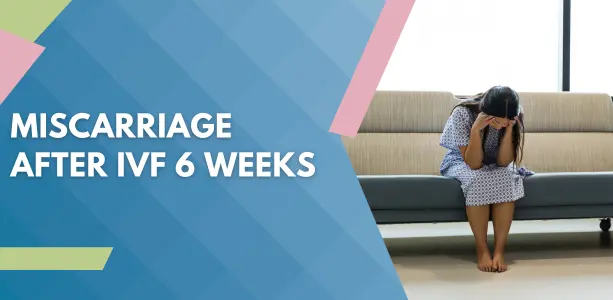Experiencing a miscarriage after IVF 6 weeks can be an emotionally and physically challenging journey for many couples. While IVF (In Vitro Fertilization) presents a beacon of hope for many aspiring parents, the journey is often fraught with challenges, and the risk of miscarriage remains a reality that many must confront.
Dr. Mohit Saraogi, a renowned expert in Infertility Treatment in Mumbai, offers compassionate guidance and support for those navigating this difficult time. This article talks about symptoms, impacts on mental health, and the path to recovery miscarriage after IVF. It focuses on ensuring patients have the necessary knowledge and support for their journey towards success after IVF miscarriage.
Understand more about Miscarriage 6 weeks post Ivf through our guide which helps you navigate through the unexpected twists and turns of miscarriage.
Miscarriage After IVF 6 Weeks

Going through a miscarriage after IVF 6 weeks is tough for many couples. It’s important to know that miscarriages can happen for many reasons, like genetics or other health issues.
The chances of having a miscarriage after IVF are similar to getting pregnant the natural way. This shows just how complex and delicate early pregnancy is. Getting to grips with this can help couples deal with their loss and start to heal.
Begin Your Journey to Healing and discover how to recover after a miscarriage following IVF. Contact the experts now!
Identifying symptoms early is key. Know more about indications of miscarriage post IVF
Symptoms of Miscarriage After IVF

Here’s the deal: acknowledging and addressing your mental health is a strength, not a weakness. Know more further!
Effects on Mental Health after Miscarriage

Your Health Comes First! Let us guide you through a safe recovery process, tailored to your body’s needs. Book an appointment now!
Looking Forward: Next Steps After Miscarriage

- Allow time for emotional and physical healing before trying to conceive
- Consult with a healthcare provider to determine the best timing for future fertility treatments.
- Consider counseling or support groups to address emotional well-being and cope with loss.
- Undergo medical evaluations to identify any underlying causes of the miscarriage and address them before attempting another pregnancy.
- Discuss with your fertility specialist the adjustments or changes in treatment strategy for future IVF cycles.
Still wondering about the recovery options? Learn with us and get to know more.
Physical Recovery After a Miscarriage
Physical recovery after a miscarriage involves several aspects, each important for the body to heal and for future healthy pregnancy considerations:

- Bleeding and Cramping: After a miscarriage, it’s common to experience vaginal bleeding similar to a menstrual period for up to two weeks. Also it can be accompanied by mild to moderate abdominal cramping. These symptoms gradually decrease as the body expels pregnancy tissues.
- Rest and Recuperation: Giving the body ample time to rest is crucial. Avoid hard activities and heavy lifting for a few weeks to allow internal healing.
- Monitoring Health: Watch for signs of infection, such as fever, excessive bleeding, or foul-smelling vaginal discharge. These symptoms require immediate medical attention.
- Nutritional Support: A balanced diet rich in vitamins, minerals, and iron can help replenish the body and aid in recovery. Hydration is also vital.
- Contraception Considerations: Fertility can return quickly following a miscarriage. It’s essential to discuss contraception options if delaying future healthy pregnancy is desired.
Each person’s recovery is unique. It’s important to follow a doctor’s guidance. Tailor the guidance to their needs and circumstances.
Learn more about why miscarriages happen after IVF and know you’re not alone in this. Contact the experts now!
Conclusion
A miscarriage after IVF 6 weeks is a challenging experience, but with the right support and guidance, couples can navigate this journey towards healing and hope. Dr. Mohit Saraogi is committed to providing empathetic care and expert Infertility Treatment in Mumbai, helping couples achieve their dreams of parenthood.
FAQ
1. How long do you bleed after a miscarriage at 6 weeks?
Bleeding can last for up to two weeks, but it varies from person to person. If bleeding is heavy or prolonged, seek medical advice.
2. Is miscarriage after IVF more common than natural pregnancies?
The chance of miscarriage after IVF is like that of natural pregnancies. Age and health conditions also play a role.
3. How long should I wait before trying another round of IVF after a miscarriage?
It’s usually advised to wait for one to three menstrual cycles to allow the body to recover. But, ask your healthcare provider for personal advice.
4. How can I support my partner or be supported by my partner after a miscarriage?
Support can include sharing feelings. It can involve getting counseling together. And, it means being patient with each other during healing.

